Private WSP
Deliver highly personalize WhatsApp messages to encrypted phone numbers with great ease!
Many businesses are averse to sharing the contact details of their users with third-party platforms like WebEngage.
We understand your concerns.
This is why, we've made it possible for you to leverage a user's PII (Personally Identifiable Information) for sending WhatsApp campaigns without actually sharing their phone numbers! This can be achieved by setting up a Private WSP API endpoint at your end.
Private WhatsApp Service Provider Basics
You can think of Private WSP as a proxy layer that decrypts phone numbers of a WhatsApp campaign's target audience before sending it to your WSP for delivery to your users. All you need to do is:
Step 1: Pass hashed PII data to WebEngage from your servers.
Step 2: Set up a Private WSP API endpoint to decrypt hashed phone numbers and integrate with WebEngage.
Step 3: Configure Webhooks to ensure that the delivery status notifications (Sent, Delivered, Read, Failed) are relayed for each message from your WSP --> Decryption Layer --> WebEngage dashboard.
Step 4: Select Private WSP as the preferred WSP while creating the WhatsApp campaign.
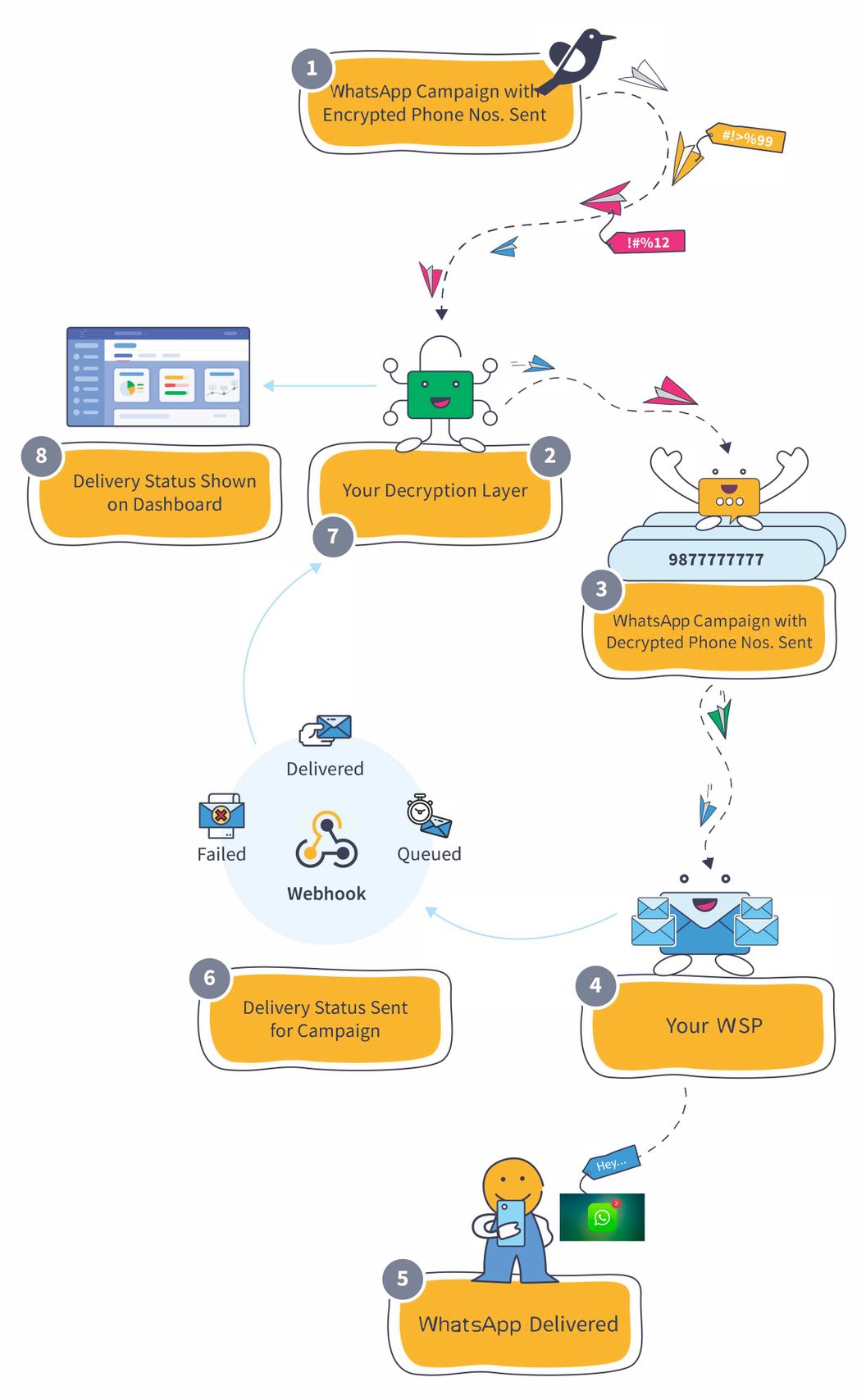
PII Hashing
At WebEngage, we refer to User Attributes such as phone and email as PII (Personally Identifiable Information), which can be encrypted to safeguard your user's privacy.
Thus, the term PII Hashing refers to the encryption of these details. If you opt to do so, then instead of passing actual data against the attributes mentioned above, you will need to pass the hashed values against the attributes, hashed_phone and hashed_email, respectively.
Passing Hashed PII Values
All our platform integration SDKs enable you to pass hashed phone numbers and email addresses for each user. Here are a few examples to help you get started:
webengage.user.setAttribute({
'we_hashed_phone': 'e0ec043b3f9e198ec09041687e4d4e8d',
'we_hashed_email': '144e0424883546e07dcd727057fd3b62'
});weUser.setHashedEmail(String hashedEmail)
weUser.setHashedPhoneNumber(String hashedPhoneNumber)-(void) setHashedEmail:(NSString*)hasdhedemail;
-(void) setHashedPhone:(NSString*)hashedphone;Please Note:
- The values passed against
hashed_phonemust be encrypted in a format that you can decrypt later through the Private SSP. - The encrypted value can be a maximum of 512 characters. Additional characters will be truncated.
- Please ensure that the actual phone number is never passed through this method.
Start Here!
You can also choose to pass and update hashed PII attributes through the WebEngage REST API.
How to Configure Private WSP
Now that you're sending us encrypted user data, let's show you how you can leverage it to engage users (while keeping their identity a top-secret!)
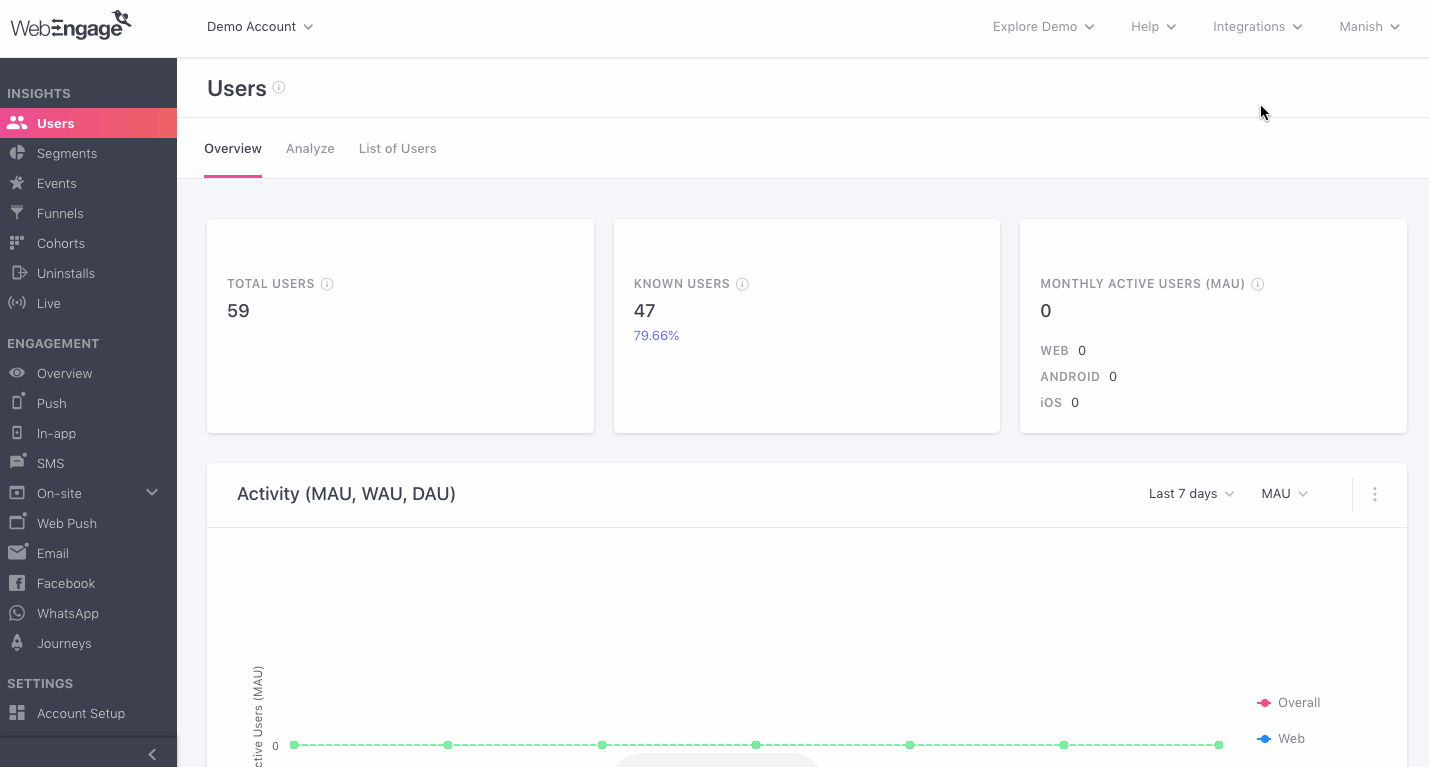
Click to enlarge
As shown above:
Step 1: Access Integrations > Channels > WhatsApp
-
Click on Add WhatsApp Service Provider to get started.
-
In doing so, you will be prompted by a pop-up. Click the first dropdown and select Private WSP.
Step 2: Add Business Number
- Add the registered phone number through which users will receive your WhatsApp messages. (Here are a few best practices to help you get started.)
Step 3: Add URL
-
As shown above, Add the endpoint URL of your Private WSP layer.
-
Each time you launch a campaign, where Private WSP is selected as the preferred WSP, we will
POSTan API call to this URL inJSON.
Step 4: Specify Request Type
Before configuring this field, please check with your WSP about the type of data they are willing to ingest from your Private WSP endpoint. While some WSPs prefer to ingest the entire message (containing the whitelisted template's text and values of personalization variables) in the message payload, others prefer to receive only the personalization tokens.
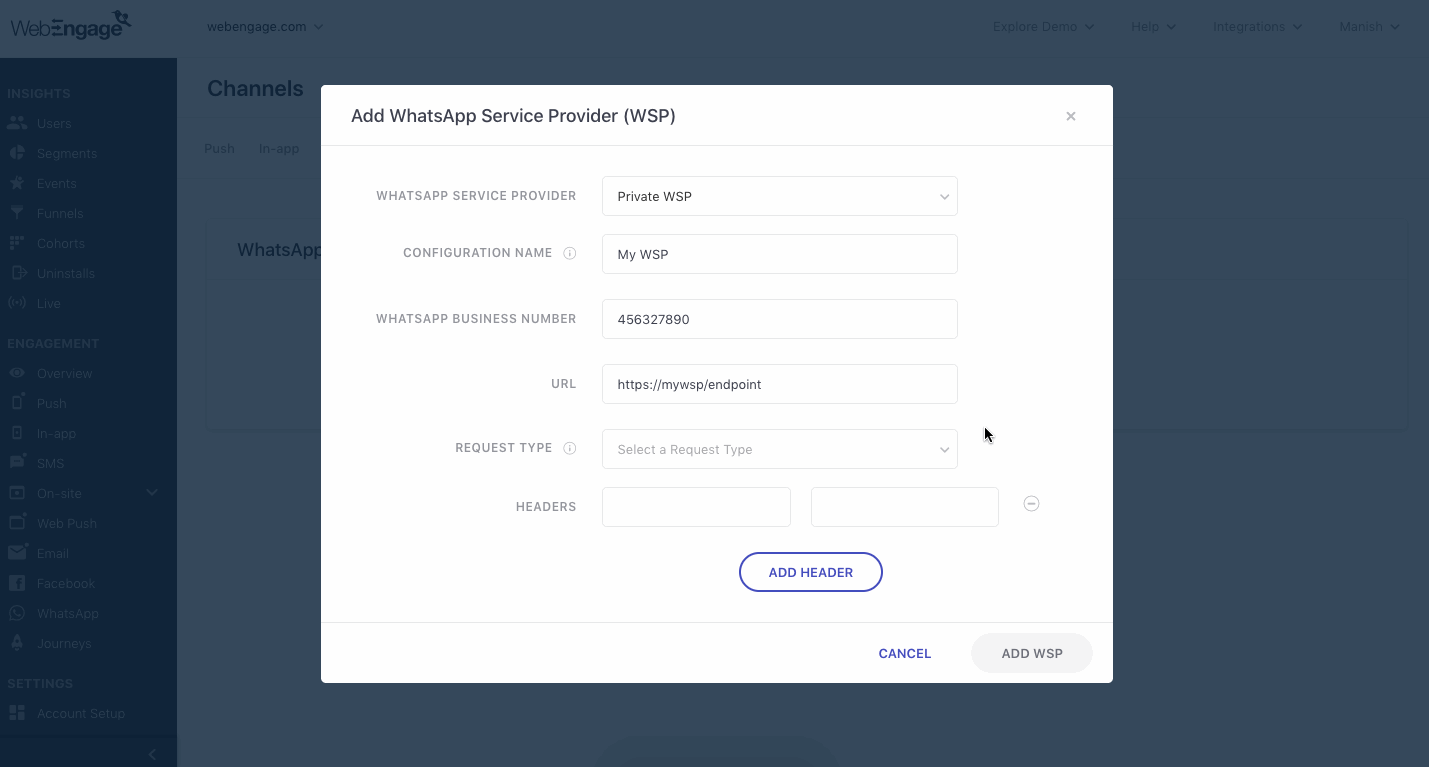
Click to enlarge
As shown above:
-
SelectSend Entire Message to pass the template's text and personalization variables from WebEngage to your Private WSP layer. (Sample Request Payload)
-
SelectSend Personalization Variables to pass only values of the personalization variables from WebEngage to your Private WSP layer. This way, your WSP will populate the selected message template (that has been whitelisted by them) with only the personalization variables for each user before delivery. (Sample Request Payload)
Understanding Request TypeFor example, let's assume that your template is:
Hey
{{1}}, we're delighted to have you aboard! Here's your code,{{2}}to help you get started!Where,
Variable
{{1}}= NameVariable
{{2}}= Unique PasswordThen the WhatsApp message received by the user, Sophie would be:
Hey
Sophie, we're delighted to have you aboard! Here's your code,Sph512Xto help you get started!Thus, if you've selected Send Entire Message against Request Type, then you will receive the above message in the payload.
However, if you select Send Personalization Variables against Request Type, then you will receive only values of the template variables - [
Sophie,Sph512X] in the message payload.
Step 5 (Optional): Add Custom Headers
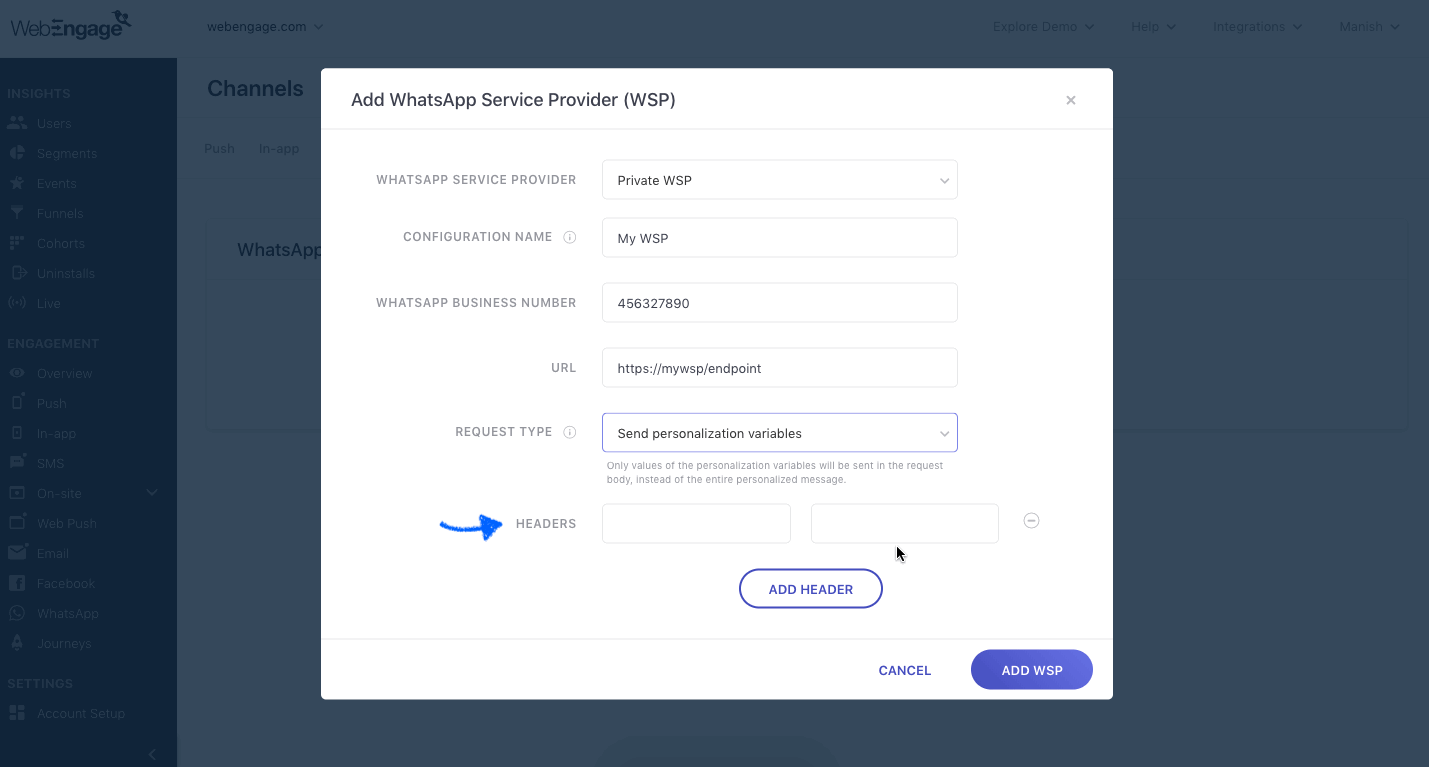
Click to enlarge
-
You can choose to pass custom data as key-value pairs by adding them here in
JSON. This field can also be used to pass Authorization Headers. -
Click Add Headers to continue adding custom data.
-
Click Add WSP to save the details.
Step 6: Add WebEngage Webhook URL to Private WSP
Adding the WebEngage Webhook to your decryption layer will enable us to receive Delivery Status Notifications (DSNs) for each user. This includes campaign performance indicators like message delivered, failed, and queued.
Here's how you can go about it:
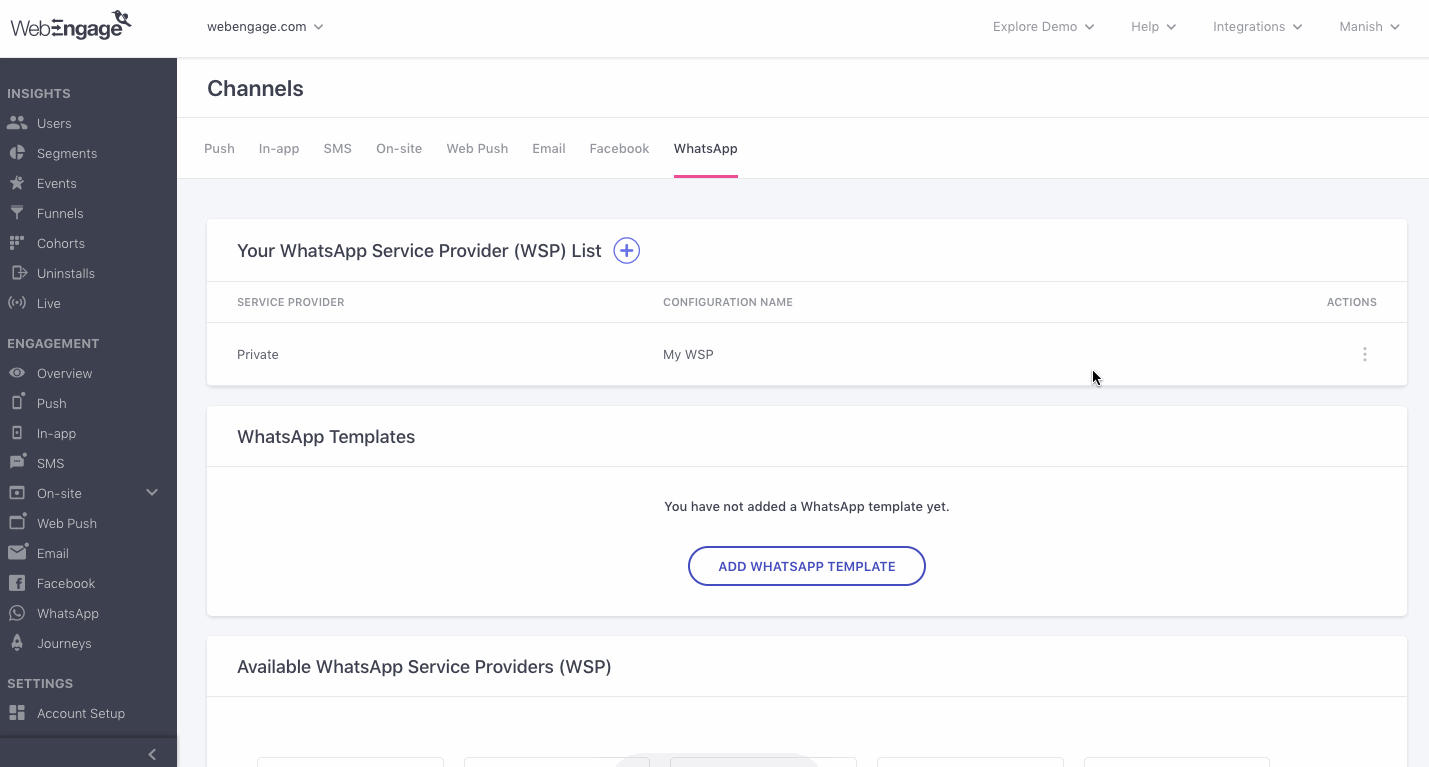
Click to enlarge
Step 6.1.: As shown above, you will find the integrated Private WSP under the section, Your WhatsApp Service Provider List. Click the Actions overflow menu on the right-side.
Step 6.2: Click View Webhook URL.
-
In doing so, a pop-up containing the static endpoint URL will appear on the screen.
-
Copy the URL and configure it as the WebEngage endpoint for sending POST API response containing the DSN.
Step 6.3: Request your Onboarding Manager for a security token (Auth Token/ API Key). This must be added to your DSN request as an authorization header, for example: Authorization: Bearer <Security Token>. You can also drop in a message at [email protected] to get your Auth Token.(How it works)
Congratulations!You have successfully integrated your Private WSP with WebEngage.
You can test the integration by creating a campaign targeting opted-in internal users (aka your teammates) to ensure everything's running smoothly.
Request
About Link Wrapping/Shortening in MessageIf your Private WSP is performing additional link wrapping on the links already wrapped by WebEngage (original URL) anywhere in the request payload, then the wrapped domain must ask the caller to follow the original URL-encoded location.
For example, let's assume that the message has the following hyperlink:
<a href=“https://google.co.in/?param=%3D%3D%2B%20%20abcd”> Link </a>We have a parameter named
paramwith a value of==+ abcdhere.Thus, if you are further wrapping this link, then the wrapped domain must ask the caller to follow the URL-encoded location
(https://google.co.in/?param=%3D%3D%2B%20%20abcd), and not the decoded one(https://google.co.in/?param===+ abcd).
Sample POST Request
Here's a sample code snippet to help you understand the format in which you will receive the payload from WebEngage:
{
"version": "1.0",
"whatsAppData": {
"toNumber": "91902867XXXX",
"fromNumber": "91334180XXXX",
"templateData": {
"templateName": "templatexyz",
"templateVariables": [
"test" ],
"language": "en",
"type": "TEXT",
"buttonUrlParam": "test", // In the case of dynamic CallToAction
"buttonUrlDynamicParam": "test", // In the case of two dynamic CallToAction
"copyCodeText": "TESTCODE", // In the case of copy offer code button
},
"customData": {
"key": "value"
}
},
"metadata": {
"campaignType": "PROMOTIONAL",
"timestamp": "2024-07-03T05:13:15+0000",
"messageId": "ed70a6d4-431c-4d18-a062-a4d0a6c68153"
}
}{
"version": "1.0",
"whatsAppData": {
"toNumber": "91902867XXXX",
"fromNumber": "91334180XXXX",
"templateData": {
"templateName": "templatexyzVIDEO",
"message": "hello john, welcome to new world",
"templateVariables": ["john", "world"],
"type" : "VIDEO",
"mediaUrl":"https://www.webenagege.com/webengage-logo.png",
"buttonUrlParam": "test", // In the case of dynamic CallToAction
"buttonUrlDynamicParam": "test", // In the case of two dynamic CallToAction
"copyCodeText": "TESTCODE", // In the case of copy offer code button
"language": "en"
},
"customData": {
"key1": "value1",
"key": "value"
}
},
"metadata": {
"campaignType": "PROMOTIONAL",
"timestamp": "2018-01-25T10:24:16+0000",
"messageId": "webengage-message-id"
}
}{
"version": "1.0",
"whatsAppData": {
"toNumber": "91902867XXXX",
"fromNumber": "91334180XXXX",
"templateData": {
"templateName": "templatexyzIMAGE",
"message": "hello john, welcome to new world",
"templateVariables": ["john", "world"],
"type" : "IMAGE",
"mediaUrl":"https://www.webenagege.com/webengage-logo.png",
"buttonUrlParam": "test", // In the case of dynamic CallToAction
"buttonUrlDynamicParam": "test", // In the case of two dynamic CallToAction
"copyCodeText": "TESTCODE", // In the case of copy offer code button
"language": "en"
},
"customData": {
"key1": "value1",
"key": "value"
}
},
"metadata": {
"campaignType": "PROMOTIONAL",
"timestamp": "2018-01-25T10:24:16+0000",
"messageId": "webengage-message-id"
}
}{
"version": "1.0",
"whatsAppData": {
"toNumber": "91902867XXXX",
"fromNumber": "91334180XXXX",
"templateData": {
"templateName": "templatexyzDOC",
"message": "hello john, welcome to new world",
"templateVariables": ["john", "world"],
"type" : "DOCUMENT",
"mediaUrl":"https://www.webenagege.com/webengage-logo.png",
"fileName": "<file-name if added>",
"buttonUrlParam": "test", // In the case of dynamic CallToAction
"buttonUrlDynamicParam": "test", // In the case of two dynamic CallToAction
"copyCodeText": "TESTCODE", // In the case of copy offer code button
"language": "en"
},
"customData": {
"key1": "value1",
"key": "value"
}
},
"metadata": {
"campaignType": "PROMOTIONAL",
"timestamp": "2018-01-25T10:24:16+0000",
"messageId": "webengage-message-id"
}
}{
"version": "1.0",
"whatsAppData": {
"toNumber": "91902867XXXX",
"fromNumber": "91334180XXXX",
"templateData": {
"templateName": "templatexyzDOC",
"message": "hello john, welcome to new world",
"templateVariables": ["john", "world"],
"type" : "LOCATION",
"longitude":15.946519,
"latitude":45.946519,
"locationName":"Name of the location",
"locationAddress":"Address",
"buttonUrlParam": "test", // In the case of dynamic CallToAction
"buttonUrlDynamicParam": "test", // In the case of two dynamic CallToAction
"copyCodeText": "TESTCODE", // In the case of copy offer code button
"language": "en"
}
},
"metadata": {
"campaignType": "PROMOTIONAL",
"timestamp": "2018-01-25T10:24:16+0000",
"messageId": "webengage-message-id"
}
}{
"version": "1.0",
"whatsAppData": {
"toNumber": "919028670XXXX",
"fromNumber": "91334180XXXX",
"templateData": {
"templateName": "carousel cards image",
"templateVariables": ["john"],
"language": "en",
"type": "CAROUSEL",
"carousel": {
"cards": [ {
"header": {
"type": "IMAGE/VIDEO",
"mediaUrl": "mediaurl"
},
"placeholders": ["test"],
"buttonUrlParam": "test"// In the case of dynamic CallToAction
},
{
"header": {
"type": "IMAGE/VIDEO",
"mediaUrl": "mediaurl2"
},
"placeholders": ["test"],
"buttonUrlParam": "test"// In the case of dynamic CallToAction
}
] }
},
"customData": {
"key": "value"
}
},
"metadata": {
"campaignType": "PROMOTIONAL",
"timestamp": "2024-07-03T05:17:21+0000",
"messageId": "75200558-d23b-49a9-886e-cf0a8d8d6a5e"
} }-
Location:
<PRIVATE-WSP-API-END-POINT>will be replaced with the URL provided during configuration. -
Headers: WebEngage will add
“Content-Type”: “application/json”by default as a header in thePOSTcall. All other custom headers specified during configuration will also be included here.
Let's break down each parameter included in thewhatsAppData container:
Key | What It Means |
|---|---|
| Indicates the payload contract. If there is any change in the payload structure in future, the version will be updated. |
| The recipient’s encoded phone number along with prefixed country code. |
| The WhatsApp Business Number you are using to send the campaign. |
| Name of the whitelisted template being used by you. |
| Indicates the exact message that needs to be delivered to a user (as per the template and template variables populated at Step 3: Message while creating the WhatsApp campaign). This key is included in the payload only if you select Send Entire Message against Request Type during configuration. |
| Indicates string values of all personalization variables, in the exact sequence, as per the template selected at Step 3: Message while creating the WhatsApp campaign. This key is included in the payload only if you select Send Personalization Variables against Request Type during configuration. |
| Indicates the language in which the WhatsApp Message template was created in WebEngage. |
| Indicates the Dynamic call to Action placeholder value This key is included in the payload only if Dynamic CTA buttons are added in the WhatsApp template |
| Indicates second Dynamic call to Action placeholder value This key is included in the payload only if 2 Dynamic CTA buttons are added in the WhatsApp template |
| Indicates the WhatsApp media template type This key is included in the payload only for media templates: TEXT, VIDEO, IMAGE, DOCUMENT, LOCATION, CAROUSEL |
| Resource URL link which is to be sent This key is included for VIDEO, IMAGE, DOCUMENT, CAROUSEL media templates |
| In this section , you can pass extra data (in Key-value pair format from the dashboard) in the payload. |
| Longitude value This key is included for LOCATION template only |
| Latitude value This key is included for LOCATION template only |
| Name of the location This key is included for LOCATION template only |
| Address of the location This key is included for LOCATION template only |
Here's what each parameter included in themetadata container denotes:
| Key | What It Means |
|---|---|
campaignType | The value of this key can be either PROMOTIONAL or TRANSACTIONAL, as selected at Step 1: Audience while creating the WhatsApp campaign in your dashboard. |
timestamp | Indicates the time at which the message was sent from WebEngage to your Private SSP. It follows the ISO date format: yyyy-MM-ddTHH:mm:ss±hhmm. |
messageId | A unique ID assigned to each message sent from your campaign. Please ensure that this ID is specified in each Delivery Status Notification sent in Response from your Private WSP. |
Request Containing Only Personalization Variables in Payload
Here's a sample cURL POST API request sent from WebEngage to your Private WSP for Request Type: Send Personalization Variables.
curl --location --request POST '<WSP-API-END-POINT>' \
--header '<HEADERS-PROVIDED-BY-YOU-IN-CONFIGURATION>' \
--header 'Content-Type: application/json' \
--data-raw '{
"version": "1.0",
"whatsAppData": {
"toNumber": "919999999999",
"fromNumber": "44000000099",
"templateData": {
"templateName": "templatexyz",
"templateVariables": ["john", "world"],
"type" : "TEXT",
"buttonUrlParam" : "XYZ.pdf", // In the case of dynamic CallToAction
"language": "en"
}
},
"metadata": {
"campaignType": "PROMOTIONAL",
"timestamp": "2018-01-25T10:24:16+0000",
"messageId": "webengage-message-id"
}
}curl --location --request POST '<WSP-API-END-POINT>' \
--header '<HEADERS-PROVIDED-BY-YOU-IN-CONFIGURATION>' \
--header 'Content-Type: application/json' \
--data-raw '{
"version": "1.0",
"whatsAppData": {
"toNumber": "919999999999",
"fromNumber": "44000000099",
"templateData": {
"templateName": "templatexyzVIDEO",
"templateVariables": ["john", "world"],
"type" : "VIDEO",
"mediaUrl":"https://www.webenagege.com/webengage-logo.png",
"buttonUrlParam" : "XYZ.pdf", // In the case of dynamic CallToAction
"language": "en"
}
},
"metadata": {
"campaignType": "PROMOTIONAL",
"timestamp": "2018-01-25T10:24:16+0000",
"messageId": "webengage-message-id"
}
}curl --location --request POST '<WSP-API-END-POINT>' \
--header '<HEADERS-PROVIDED-BY-YOU-IN-CONFIGURATION>' \
--header 'Content-Type: application/json' \
--data-raw '{
"version": "1.0",
"whatsAppData": {
"toNumber": "919999999999",
"fromNumber": "44000000099",
"templateData": {
"templateName": "templatexyzIMAGE",
"templateVariables": ["john", "world"],
"type" : "IMAGE",
"mediaUrl":"https://www.webenagege.com/webengage-logo.png",
"buttonUrlParam" : "XYZ.pdf", // In the case of dynamic CallToAction
"language": "en"
}
},
"metadata": {
"campaignType": "PROMOTIONAL",
"timestamp": "2018-01-25T10:24:16+0000",
"messageId": "webengage-message-id"
}
}curl --location --request POST '<WSP-API-END-POINT>' \
--header '<HEADERS-PROVIDED-BY-YOU-IN-CONFIGURATION>' \
--header 'Content-Type: application/json' \
--data-raw '{
"version": "1.0",
"whatsAppData": {
"toNumber": "919999999999",
"fromNumber": "44000000099",
"templateData": {
"templateName": "templatexyzDOC",
"templateVariables": ["john", "world"],
"type" : "DOCUMENT",
"mediaUrl":"https://www.webenagege.com/webengage-logo.png",
"fileName": "<file-name if added>",
"buttonUrlParam" : "XYZ.pdf", // In the case of dynamic CallToAction
"language": "en"
}
},
"metadata": {
"campaignType": "PROMOTIONAL",
"timestamp": "2018-01-25T10:24:16+0000",
"messageId": "webengage-message-id"
}
}curl --location --request POST '<WSP-API-END-POINT>' \
--header '<HEADERS-PROVIDED-BY-YOU-IN-CONFIGURATION>' \
--header 'Content-Type: application/json' \
--data-raw '{
"version": "1.0",
"whatsAppData": {
"toNumber": "919999999999",
"fromNumber": "44000000099",
"templateData": {
"templateName": "templatexyzDOC",
"templateVariables": ["john", "world"],
"type" : "LOCATION",
"longitude":15.946519,
"latitude":45.946519,
"locationName":"Name of the location",
"locationAddress":"Address",
"buttonUrlParam" : "XYZ.pdf", // In the case of dynamic CallToAction
"language": "en"
}
},
"metadata": {
"campaignType": "PROMOTIONAL",
"timestamp": "2018-01-25T10:24:16+0000",
"messageId": "webengage-message-id"
}
}{
"version": "1.0",
"whatsAppData": {
"toNumber": "919028670XXXX",
"fromNumber": "91334180XXXX",
"templateData": {
"templateName": "carousel cards image",
"templateVariables": ["john"],
"language": "en",
"type": "CAROUSEL",
"carousel": {
"cards": [ {
"header": {
"type": "IMAGE/VIDEO",
"mediaUrl": "mediaurl"
},
"placeholders": ["test"],
"buttonUrlParam": "XYZ.pdf"// In the case of dynamic CallToAction
},
{
"header": {
"type": "IMAGE/VIDEO",
"mediaUrl": "mediaurl2"
},
"placeholders": ["test"],
"buttonUrlParam": "XYZ.pdf"// In the case of dynamic CallToAction
}
] }
},
"customData": {
"key": "value"
}
},
"metadata": {
"campaignType": "PROMOTIONAL",
"timestamp": "2024-07-03T05:17:21+0000",
"messageId": "75200558-d23b-49a9-886e-cf0a8d8d6a5e"
} }Request Containing Entire Message in Payload
Here's a sample cURL POST API request sent from WebEngage to your Private WSP for Request Type: Send Entire Message.
curl --location --request POST '<WSP-API-END-POINT>' \
--header '<HEADERS-PROVIDED-BY-YOU-IN-CONFIGURATION>' \
--header 'Content-Type: application/json' \
--data-raw '{
"version": "1.0",
"whatsAppData": {
"toNumber": "+919999999999",
"fromNumber": "99999999999",
"templateData": {
"templateName": "text_template",
"message": "hello john, welcome to new world",
"header": "Header",
"footer": "Footer",
"language": "en",
"type": "TEXT",
"buttonUrlParam": "/home",
"copyCodeText": "1234",
"buttons": [
{
"templateButtonType": "CALL_TO_ACTION",
"buttons": [
{
"templateButtonActionType": "VISIT_WEBSITE",
"buttonText": "Visit Website",
"templateButtonUrlType": "STATIC"
},
{
"templateButtonActionType": "VISIT_WEBSITE",
"buttonText": "Check blog",
"templateButtonUrlType": "DYNAMIC",
"buttonUrlContent": "/home"
},
{
"templateButtonActionType": "CALL_PHONE_NUMBER",
"buttonText": "Call Us"
},
{
"templateButtonActionType": "COPY_CODE",
"buttonText": "copy code",
"copyCodeText": "1234"
}
]
},
{
"templateButtonType": "QUICK_REPLY",
"buttons": [
{
"buttonText": "Yes"
},
{
"buttonText": "No"
},
{
"buttonText": "May be"
}
]
}
]
},
"customData": {
"key1": "value1",
"key2": "value2"
}
},
"metadata": {
"campaignType": "PROMOTIONAL",
"timestamp": "2025-01-28T08:42:22+0000",
"messageId": "d9672b7d-a20f-48ee-a0bc-c9ef532b318b"
}
}curl --location --request POST '<WSP-API-END-POINT>' \
--header '<HEADERS-PROVIDED-BY-YOU-IN-CONFIGURATION>' \
--header 'Content-Type: application/json' \
--data-raw '{
"version": "1.0",
"whatsAppData": {
"toNumber": "+919999999999",
"fromNumber": "99999999999",
"templateData": {
"templateName": "Video_template",
"message": "hello john, welcome to new world",
"header": "",
"footer": "Footer",
"language": "en",
"type": "VIDEO",
"mediaUrl": "https://commondatastorage.googleapis.com/gtv-videos-bucket/sample/BigBuckBunny.mp4",
"buttonUrlParam": "www.google.com",
"buttons": [
{
"templateButtonType": "QUICK_REPLY",
"buttons": [
{
"buttonText": "Yes"
},
{
"buttonText": "No"
}
]
},
{
"templateButtonType": "CALL_TO_ACTION",
"buttons": [
{
"templateButtonActionType": "CALL_PHONE_NUMBER",
"buttonText": "Call Us"
},
{
"templateButtonActionType": "VISIT_WEBSITE",
"buttonText": "Visit Website",
"templateButtonUrlType": "DYNAMIC",
"buttonUrlContent": "www.google.com"
}
]
}
]
},
"customData": {
"key1": "value1",
"key2": "value2"
}
},
"metadata": {
"campaignType": "PROMOTIONAL",
"timestamp": "2025-01-28T10:30:17+0000",
"messageId": "99df3b19-4d23-4944-a688-6bc616f43c3c"
}
}curl --location --request POST '<WSP-API-END-POINT>' \
--header '<HEADERS-PROVIDED-BY-YOU-IN-CONFIGURATION>' \
--header 'Content-Type: application/json' \
--data-raw '{
"version": "1.0",
"whatsAppData": {
"toNumber": "+919999999999",
"fromNumber": "99999999999",
"templateData": {
"templateName": "image_template",
"message": "hello john, welcome to new world",
"header": "",
"footer": "Footer",
"language": "en",
"type": "IMAGE",
"mediaUrl": "https://afiles.webengage.com/aa131d2c/f181dbb6-7aa1-4924-94dd-416d09eb425e.jpg",
"buttons": [
{
"templateButtonType": "CALL_TO_ACTION",
"buttons": [
{
"templateButtonActionType": "VISIT_WEBSITE",
"buttonText": "Visit Website",
"templateButtonUrlType": "STATIC"
}
]
},
{
"templateButtonType": "QUICK_REPLY",
"buttons": [
{
"buttonText": "Interested"
},
{
"buttonText": "Not Interested"
}
]
}
]
},
"customData": {
"key1": "value1",
"key2": "value2"
}
},
"metadata": {
"campaignType": "PROMOTIONAL",
"timestamp": "2025-01-28T14:54:22+0000",
"messageId": "5d49d79a-c154-42e6-bf63-1f78abad7561"
}
}curl --location --request POST '<PRIVATE-WSP-API-END-POINT>' \
--header '<HEADERS-PROVIDED-BY-YOU-IN-CONFIGURATION>' \
--header 'Content-Type: application/json' \
--data-raw '{
"version": "1.0",
"whatsAppData": {
"toNumber": "+919999999999",
"fromNumber": "99999999999",
"templateData": {
"templateName": "document_template",
"message": "hello john, welcome to new world",
"header": "",
"footer": "Footer",
"language": "en",
"type": "DOCUMENT",
"mediaUrl": "https://afiles.webengage.com/aa131d2c/a53c8262-63ea-46f8-892e-0273ce18554a.pdf",
"fileName": "Itinerary",
"buttons": [
{
"templateButtonType": "QUICK_REPLY",
"buttons": [
{
"buttonText": "Get More Details"
},
{
"buttonText": "Not Interested"
}
]
},
{
"templateButtonType": "CALL_TO_ACTION",
"buttons": [
{
"templateButtonActionType": "CALL_PHONE_NUMBER",
"buttonText": "Call Us"
}
]
}
]
},
"customData": {
"key1": "value1",
"key2": "value2"
}
},
"metadata": {
"campaignType": "PROMOTIONAL",
"timestamp": "2025-01-28T15:08:22+0000",
"messageId": "ee558056-2bd8-4e1b-9d0a-09211b2f0193"
}
}
curl --location --request POST '<WSP-API-END-POINT>' \
--header '<HEADERS-PROVIDED-BY-YOU-IN-CONFIGURATION>' \
--header 'Content-Type: application/json' \
--data-raw '{
"version": "1.0",
"whatsAppData": {
"toNumber": "+919999999999",
"fromNumber": "99999999999",
"templateData": {
"templateName": "location_template",
"message": "hello john, welcome to new world",
"header": "",
"footer": "",
"language": "en",
"type": "LOCATION",
"latitude": "45.946519",
"longitude": "15.946519",
"locationName": "Name of the location",
"locationAddress": "Address",
"copyCodeText": "123456",
"buttons": [
{
"templateButtonType": "CALL_TO_ACTION",
"buttons": [
{
"templateButtonActionType": "COPY_CODE",
"buttonText": "copy code",
"copyCodeText": "123456"
}
]
},
{
"templateButtonType": "QUICK_REPLY",
"buttons": [
{
"buttonText": "Yes"
},
{
"buttonText": "No"
}
]
}
]
},
"customData": {
"key1": "value1",
"key2": "value2"
}
},
"metadata": {
"campaignType": "PROMOTIONAL",
"timestamp": "2025-01-28T15:16:21+0000",
"messageId": "4427f430-7ad1-459b-a29c-c1c8e645b5f2"
}
}curl --location --request POST '<WSP-API-END-POINT>' \
--header '<HEADERS-PROVIDED-BY-YOU-IN-CONFIGURATION>' \
--header 'Content-Type: application/json' \
--data-raw '{
"version": "1.0",
"whatsAppData": {
"toNumber": "+919999999999",
"fromNumber": "99999999999",
"templateData": {
"templateName": "carousel_template",
"message": "hello john, welcome to new world",
"header": "",
"language": "en",
"type": "CAROUSEL",
"carousel": {
"cards": [
{
"header": {
"type": "IMAGE",
"mediaUrl": "https://i.pinimg.com/236x/11/dc/9a/11dc9ae1696e7843d998f6f3e10a9125.jpg"
},
"message": "hello john, This is Card 1 text",
"placeholders": [],
"buttonUrlParam": "jMro3y",
"buttons": [
{
"templateButtonType": "CALL_TO_ACTION",
"buttons": [
{
"templateButtonActionType": "VISIT_WEBSITE",
"buttonText": "Visit Website",
"templateButtonUrlType": "DYNAMIC",
"buttonUrlContent": "jMro3y"
},
{
"templateButtonActionType": "CALL_PHONE_NUMBER",
"buttonText": "Call Us"
}
]
}
]
},
{
"header": {
"type": "IMAGE",
"mediaUrl": "https://afiles.webengage.com/aa131d2c/47891647-c5b3-4943-a5de-023ddf54666d.png"
},
"message": "hello john, This is Card 2 text",
"placeholders": [],
"buttons": [
{
"templateButtonType": "CALL_TO_ACTION",
"buttons": [
{
"templateButtonActionType": "VISIT_WEBSITE",
"buttonText": "Visit Website",
"templateButtonUrlType": "STATIC"
},
{
"templateButtonActionType": "CALL_PHONE_NUMBER",
"buttonText": "Call Us"
}
]
}
]
},
{
"header": {
"type": "IMAGE",
"mediaUrl": "https://afiles.webengage.com/aa131d2c/4444723b-591e-4659-ac8a-484b19a83fea.jpg"
},
"message": "hello john, This is Card 3 text",
"placeholders": [],
"buttonUrlParam": "category/blogid",
"buttons": [
{
"templateButtonType": "CALL_TO_ACTION",
"buttons": [
{
"templateButtonActionType": "VISIT_WEBSITE",
"buttonText": "Check Blog",
"templateButtonUrlType": "DYNAMIC",
"buttonUrlContent": "category/blogid"
},
{
"templateButtonActionType": "CALL_PHONE_NUMBER",
"buttonText": "Contact Us"
}
]
}
]
}
]
}
},
"customData": {
"key1": "value1",
"key2": "value2"
}
},
"metadata": {
"campaignType": "PROMOTIONAL",
"timestamp": "2025-01-28T15:33:21+0000",
"messageId": "04ac98c7-0214-4a30-b010-d4959e97282e"
}
}Request Containing Key-Value Pairs in Payload
Must Read
You can choose to pass additional data in the message payload to your Private WSP by adding Key-Value Pairs at Step 3: Message, while creating the WhatsApp campaign. This comes in handy when for various custom requirements, for example: passing specific user data to your servers through Key-Value pairs like promo code/ offer type included in WhatsApp message, user type, details of the product purchased, and so on.
As shown below, all Keys and their corresponding Values are included in the customdata container in the message payload sent from WebEngage.
curl --location --request POST '<PRIVATE-WSP-API-END-POINT>' \
--header '<HEADERS-PROVIDED-BY-YOU-IN-CONFIGURATION>' \
--header 'Content-Type: application/json' \
--data-raw '{
"version": "1.0",
"whatsAppData": {
"toNumber": "+919167714989",
"fromNumber": "9167714989",
"templateData": {
"templateName": "Hello Test",
"message": "This is a test template",
"language": "en",
"type": "TEXT"
},
"customData": {
"Key 1": "Value 1",
"Key2": "Value 2",
"Name": "Rajesh"
}
},
"metadata": {
"campaignType": "PROMOTIONAL",
"timestamp": "2020-11-20T10:52:57+0000",
"messageId": "c5d5457e-6c43-41a0-8f02-35d6957d92a0"
}
}'
Please Note
All personalization variables are supported in
customdata.While you can add links in
customdata, link wrapping is not supported. Thus, clicks will not be tracked in your dashboard for links specified in Key-Value pairs.
Response (Delivery Status Notification)
For each message forwarded to your Private WSP, we expect a response containing a Delivery Status Notification (DSN). These are asynchronous updates like message delivered, expired, rejected and so on. It enables you to analyze your campaign's performance against several performance indicators in your dashboard.
DSNs can be sent as POST API requests to the WebEngage Webhook URL added to your Private WSP during configuration.
Here's a sample DSN response containing the unique Auth Token provided specifically for DSN authorization by the WebEngage support team:
curl --location --request POST '<STATIC-DSN-END-POINT-OF-WEBENGAGE>' \
--header 'Authorization: Bearer <AUTH-TOKEN-PROVIDED-BY-WEBENGAGE>' \
--header 'Content-Type: application/json' \
--data-raw '{
"version": "1.0",
"messageId" : "webengage-message-id",
"toNumber" : "ENCODEDXYZ123PHONENUMBER",
"status": "whatsapp_sent",
"statusCode" : 0,
"reason": "sent successfully to user",
"timestamp": "2018-01-25T10:24:16+0000"
}'-
DSN parameters must include the
messageIdpreviously passed inmetadataso that we're able to map it to a specific message. -
WebEngage will respond to the API call with an HTTP 2XX response code and will enqueue the event to process it.
Here's what each parameter in the above code snippet denotes:
Key | What It Means |
|---|---|
| This indicates the payload contract of the request. If there is any change in the payload structure in future, the version will be updated. |
| This is the unique ID assigned to the message which is used to identify a message uniquely. This is received by the service provider in the request body. The length of this string can be up to 500 characters. The |
| The message recipient’s phone number along with prefixed country code. |
| The message status being reported by this DSN. This can be either |
| Status code of this DSN. This must be one of the status codes listed here. |
| It is an optional field (must be given when |
| The time when the message was triggered from the WebEngage system. This follows the ISO date format: |
Synchronous Response Examples
Example 1: Message Accepted Successfully
HTTP 200 OK
{
"status" : "whatsapp_accepted",
"statusCode": 0
}Example 2: Message Cannot Be Sent Further
NOTE: If the status code is not 0, then please send the message property too.
HTTP 200 OK
{
"status": "whatsapp_rejected",
"statusCode": 2000,
"message": "Not enough credit to send message"
}Example 3: Payload Not Acceptable
The following snippet depicts a scenario where there is a mismatch in the payload version of the API contract (currently we're using v1.0).
HTTP 400 BAD REQUEST
{
"status" : "whatsapp_rejected",
"statusCode" : 2010,
"message" : "Version not supported",
"supportedVersion" : "2.0" // Mandatory in case of statusCode 2010
}Status Codes
These status codes are to be used for both, synchronous responses and asynchronous Delivery Status Notifications (DSNs). Please ensure that you send the appropriate HTTP status corresponding to the status codes.
Status Code | Description | HTTP Status |
|---|---|---|
0 | Message delivery is successful! | 200 |
2000 | Insufficient credit balance | 200 |
2001 | The IP has not been whitelisted | 401 |
2002 | Empty message body | 400 |
2003 | Invalid mobile number | 400 |
2004 | Invalid Business Number | 400 |
2005 | Authorization failure | 403 |
2006 | User blocked the Business Number | 200 |
2007 | Maximum length of the message body has been exceeded | 413 |
2008 | The message has expired | 200 |
2009 | The message was not delivered by the operator | 200 |
2010 | Payload version unsupported. In this case the | 400 |
2011 | Authentication failure (e.g. mobile number might be unverified) | 401 |
2014 | Maximum number of retries to send the message have been exhausted. | 200 |
2015 | Throttling error. To handle the loads with an increasing customer base, WebEngage has introduced autoscaling which can occasionally result in higher call rates. WebEngage supports throttling from the WSP's end to handle such cases. Sending this status code will activate throttling for that request and WebEngage will send that request at a later time. Note:
| 429 |
2019 | The message format is invalid | 400 |
2021 | Template Missing | 400 |
2022 | Template Parameter Format Mismatch | 400 |
2023 | Template did not match | 400 |
2024 | User isn't opted in for template message | 200 |
2025 | User is not Opted in and is inactive | 200 |
9988 | For outcomes not covered above. Include the appropriate error description in the "message" field of the response | 200 |
We hope this has enabled you to set up a decryption layer for sending WhatsApp campaigns to encrypted phone numbers. Please feel free to drop in a few lines at [email protected] in case you have further queries. We're always just an email away!
Updated 3 months ago